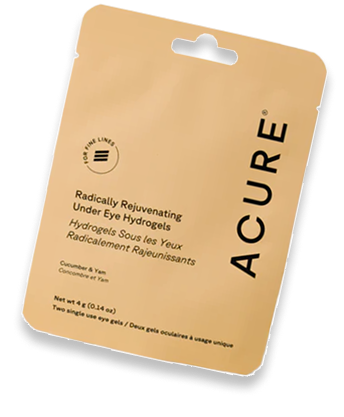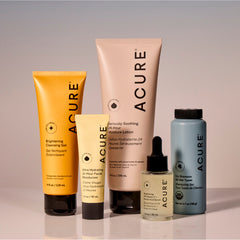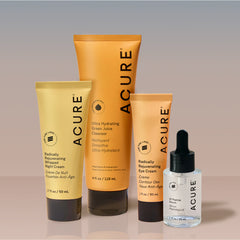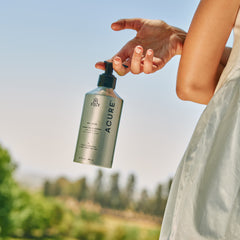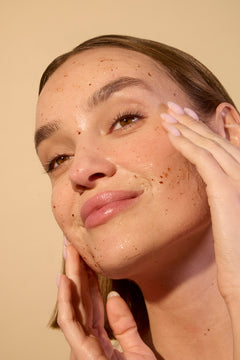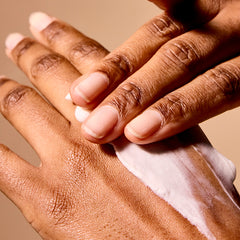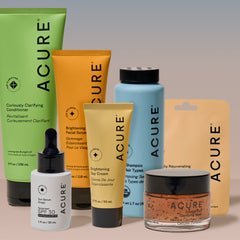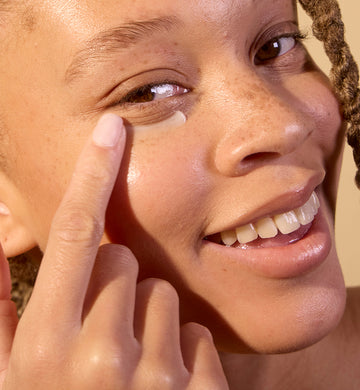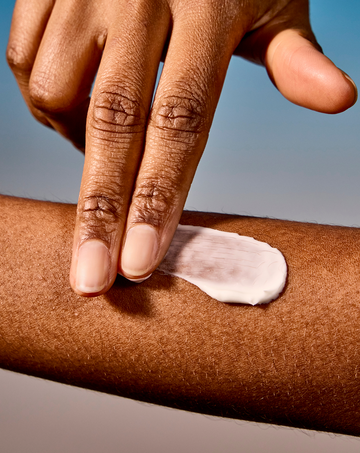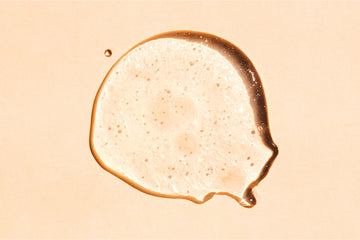Your skin hosts a complex microbiome of bacteria, fungi, and other microorganisms that help keep it healthy, protect against invaders, and support your immune system.
Your skin hosts a complex microbiome of bacteria, fungi, and other microorganisms that help keep it healthy, protect against invaders, and support your immune system. When this balance is disrupted, skin issues like acne, eczema, and sensitivity can occur. Caring for your skin microbiome is essential for clear, healthy skin.
Table of Contents
What is a Microbiome?
The Good, The Bad, and The Human Microbiome
The Microbiome and Skin Problems
How to Improve Skin Microbiome
Support Your Skin Microbiome with Acure
Your skin is home to a vast and complex network of bacteria, fungi, and other microorganisms known as the skin microbiome. These tiny organisms play a crucial role in keeping your skin healthy, protecting against harmful invaders, and even supporting your immune system. However, when your microbiome is out of balance, it can lead to various skin issues, including acne, eczema, and sensitivity. Understanding and caring for your skin microbiome is key to achieving clear, healthy skin.
What is a Microbiome?
A microbiome refers to a collection of microorganisms—bacteria, fungi, and viruses—that live in a specific environment. The human microbiome exists throughout the body, including the gut, mouth, and skin, working in harmony to maintain health.
The Skin Microbiome
Your skin, the body’s largest organ, is home to an estimated one million bacteria per square centimeter. Scientists have identified over 500 different types of bacteria on the skin, each playing a unique role in protecting and maintaining skin health.
What the Skin Microbiome Does
Acts as a natural shield against harmful pathogens.
Regulates inflammation and prevents excessive immune responses.
Maintains pH balance, keeping the skin’s barrier strong.
Supports wound healing and skin regeneration.
Communicates with the immune system to help fight off infections.
A balanced skin microbiome is key to maintaining healthy, radiant skin and reducing issues like sensitivity, breakouts, and dryness.
The Good, The Bad, and The Human Microbiome
Not all microorganisms are harmful—many bacteria on your skin are beneficial and work to keep your complexion healthy. However, imbalances can allow bad bacteria to thrive, leading to skin problems.
What Impacts the Skin Microbiome?
The composition of your microbiome and skin can change due to various factors, including:
Genetics – Some people are naturally predisposed to stronger microbiomes.
Diet – A diet rich in processed foods can affect microbial diversity.
Lifestyle Choices – Smoking and alcohol consumption can weaken the microbiome.
Environment – Air pollution and exposure to UV light can disrupt microbial balance.
Skincare Habits – Harsh cleansers and over-exfoliation can strip away beneficial bacteria.
Keeping these factors in check can help ensure a strong and resilient skin microbiome.
The Microbiome and Skin Problems
When the microbiome is out of balance, a condition known as dysbiosis, it can lead to various skin concerns. Researchers have linked microbiome imbalances to:
Eczema (Atopic Dermatitis) – Disruptions in the microbiome can weaken the skin barrier, making it more prone to irritation and inflammation.
Psoriasis – A dysfunctional microbiome may contribute to excessive immune responses.
Acne – Overgrowth of certain bacteria, like Cutibacterium acnes, can lead to breakouts.
Rosacea – Imbalances can contribute to skin redness and sensitivity.
Delayed Wound Healing – An impaired microbiome slows down skin regeneration.
Understanding the link between the microbiome and skin problems can help you take the right steps to restore balance.
How to Improve Skin Microbiome
If you experience skin sensitivity, dryness, or frequent breakouts, your skin microbiome may be unbalanced. Here are some ways to restore microbial harmony and improve skin health:
1. Wash Towels and Pillowcases Regularly
Bacteria thrive in damp environments like towels and pillowcases. Wash them at least every 3 days in hot water to prevent bacterial overgrowth.
2. Stay Hydrated
Hydration is essential for maintaining a balanced microbiome. Drinking enough water supports skin cell renewal and barrier function.
3. Exercise Regularly
Sweat helps maintain the skin’s natural pH balance and promotes beneficial bacterial growth.
4. Clean Makeup Brushes & Applicators
Unclean beauty tools can harbor bacteria that disrupt the microbiome. Wash brushes at least once a week to prevent buildup.
5. Use a Microbiome-Friendly Skincare Routine
Harsh cleansers and antibacterial soaps can strip away beneficial bacteria. Opt for gentle, microbiome-supporting skincare products like:
Ultra Hydrating Green Juice Cleanser – A mild, non-stripping cleanser that maintains microbiome balance.
Seriously Soothing Cleansing Cream – A gentle formula designed to cleanse without disrupting beneficial bacteria.
Radically Rejuvenating Whipped Night Cream – Helps replenish the skin barrier while supporting microbiome health.
Support Your Skin Microbiome with Acure
Your skin microbiome is an essential part of overall skin health, and maintaining its balance can lead to stronger, clearer, and healthier skin. At Acure, we offer microbiome-friendly skincare designed to support and protect your skin’s natural ecosystem.
